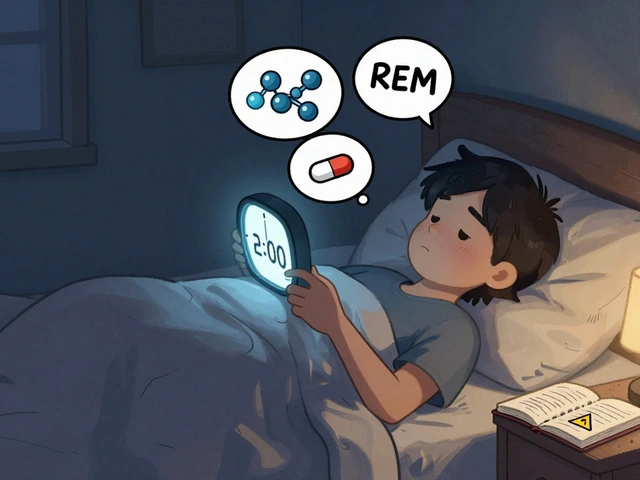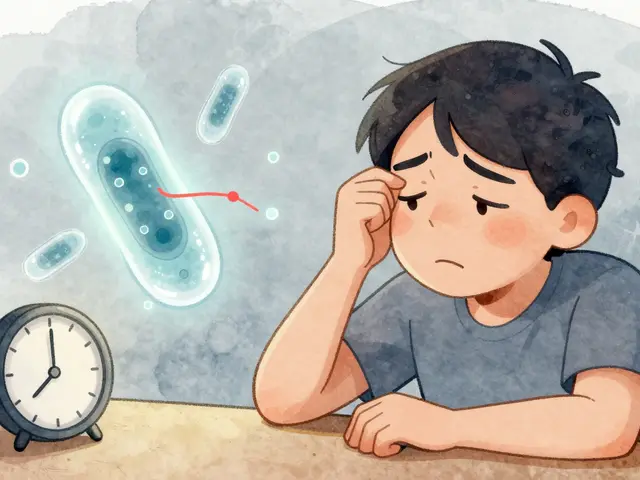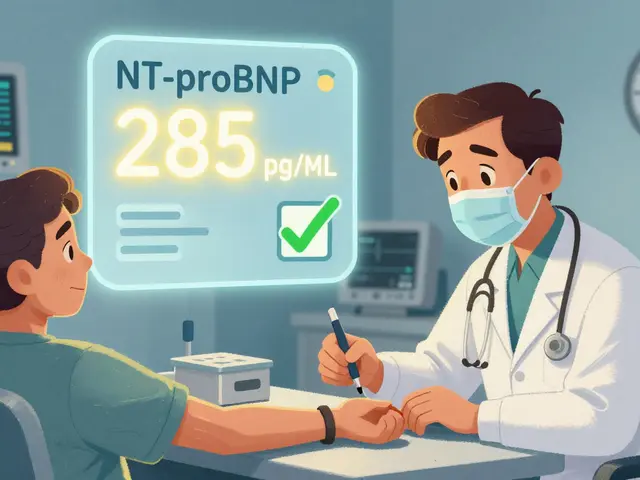Picture this: a medicine designed to tame nerve pain and quiet down seizures quietly makes its way onto prescription pads everywhere. Gabapentin’s story reads like that of a background character suddenly cast in the lead role. Each year, millions get a script, often for issues like shingles pain or restless legs, but it’s also cropped up as the go-to for migraines, anxiety, and more. But what happens next, when you don’t just use it for a few weeks—the path most studies actually cover—but keep taking it month after month, even years?
The Science Behind Gabapentin and Why Doctors Prescribe It
Gabapentin started out as an anti-seizure drug back in the early '90s. Fast forward to today, and it’s everywhere, not just for epilepsy but mostly for nerve-related pain. If you ask someone in my local high street pharmacy, they’ll tell you it’s most often handed out for nerve pain from things like shingles (postherpetic neuralgia) or diabetic neuropathy. The magic is in how gabapentin quiets those wild, restless nerves—it mimics a brain chemical called GABA. But here’s the twist: it doesn’t work the same way as natural GABA, and no one’s exactly sure why it eases nerve pain. Researchers do know gabapentin latches onto parts of your nerves (the alpha-2-delta subunit, for the technically curious), which keeps them from firing off too many pain signals.
Numbers tell their own story. In England alone, gabapentin prescriptions more than doubled over the past decade, going from 5.5 million items in 2012 to over 10 million in 2022. That’s a lot of people trusting it to help with living easier day to day. It’s also quietly become a crutch for some doctors when other treatments fail, partly because it’s not addictive in the same classic way opioids are. Of course, now and then it’s also doled out for migraines, fibromyalgia, or even anxiety—uses that haven’t got the full rubber stamp from regulators but have enough real-world backing for doctors to try it.
Daily Life on Gabapentin: What Changes—And What Stays the Same
You’ll hear some people swear it’s a wonder drug; others count the days till they come off it. Here’s what’s typical: when you first start, side effects often show up in the background. Drowsiness is a frequent visitor. Someone might start tripping over their words or lose their balance in the kitchen. These symptoms can fade as your body gets used to gabapentin—but sometimes, they stick around. Dizziness is another common one. If you’re driving or need to stay sharp (think about crossing a road in central Bristol), that wobbly feeling isn’t just annoying, it’s risky.
But here’s something interesting: the longer you take gabapentin, the more likely some effects become part of your everyday routine. A survey by the British Pain Society in 2023 found that at least 25% of long-term users woke up groggy most mornings. Memory slips and word-finding problems also turn up, especially in people over 60. These changes often creep in slow, so you might not notice until a friend points out you’re forgetting names more than you used to.
Some folks actually get the complete opposite: a weird, restless energy or trouble falling asleep. Gabapentin’s effect on sleep can go both ways, depending on your brain chemistry. And let’s not skip the rare but possible: for a handful of people, mood swings tip over into depression or even suicidal thoughts, especially if there’s a history of mental health problems. It’s one of those things people often push aside, but it pops up often enough that mental health nurses keep a sharp eye on it.
Outside the brain, the body keeps score in other ways. People can gain weight—a study out of King’s College London found that at least 10% of chronic gabapentin users put on an average of 5-6kg after a year. Fluid retention and swollen ankles aren’t rare, either. It can leave you feeling sluggish, like your body’s a size too big. The appetite boost isn’t massive, but it builds up over months.

Long-Term Physical Health: Potential Risks and Realities
So, what about the nuts and bolts—your heart, kidneys, and bones? Gabapentin’s main job is in the nervous system, but it doesn’t always stay in its lane. The kidneys clear it from your system, so if they’re even a bit off, drugs like gabapentin can build up and hit harder. Doctors say this is why older adults or folks with kidney issues need lower doses. There are reports—though not massive numbers—of people landing in hospital from gabapentin toxicity, which looks a lot like being really drunk: confusion, slurred speech, and slow reactions.
Another bit people don’t talk about much is the chance for physical dependence. Gabapentin isn’t an opioid, but there are plenty of well-documented cases in the NHS system where stopping it suddenly triggered withdrawal. Symptoms can range from sweating and agitation to insomnia and, rarely, seizures. The Royal College of Psychiatrists recommends tapering gabapentin slowly—sometimes over months—if you’ve been on it for a long while.
Now, not everyone will run into these issues, but risk adds up the longer you use it. Weakness or loss of coordination sometimes gets worse, especially for those who already struggle with mobility. There’s also chatter among pain specialists about the possibility of bone thinning (osteopenia), although the link isn’t nailed down like with some anti-epileptic meds. It comes up enough in support forums that people taking gabapentin long-term are now sometimes advised to get regular bone density checks, especially if they have other risk factors.
Check out this quick table showing some long-term effects reported in published medical studies:
| Effect | How Common? | Notes |
|---|---|---|
| Drowsiness | Up to 30% | Usually fades over time, but not always |
| Weight gain | 10-15% | More common with higher doses (>1200mg/day) |
| Memory problems | ~20% | Often subtle, but can add up |
| Physical dependence/withdrawal | 10-20% | Risks increase with long-term use |
| Mood changes | 10% | Monitor, especially if prone to depression |
| Swelling (oedema) | Up to 8% | May need to lower dose or try alternatives |
Now, what about organ damage? The good news: gabapentin isn’t known to mess with the liver, and most people’s kidneys can handle it if doses are adjusted. It’s not a direct heart risk, either, so unlike some other chronic meds, there’s no strong link with heart attacks or strokes. That said, any medicine that leaves you unsteady or sleepy could mean more falls or accidents—something older adults especially have to reckon with.
Mental and Social Impact: Not Just About the Body
This is where gabapentin’s long game really shows itself. Brain fog, sluggishness, or memory changes can turn into real life obstacles. Someone who’s always been sharp at work may start missing meetings or forgetting appointments. It’s easy to blame age, but for long-term users, gabapentin can tip the scale. There’s even research from the University of Manchester showing attention and processing speed slow down measurably in people who use gabapentin for more than a year.
Relationships can take the hit. Felt too tired to go to the pub or catch up with mates? For a surprising number of long-term users, the medicine’s toll on energy can mean fewer social outings and more time at home. It’s not always obvious at first, but if you notice you’re passing up chances to see people you like, it might be worth talking to your GP about whether gabapentin is helping as much as it once did.
On the emotional front, low mood lurks for some. Though much rarer than drowsiness or dizziness, mood swings and occasional depression make doctors and families keep a watchful eye. Mental health powers through small day-to-day hurdles, but when a medicine nudges the balance even a little, it can set off bigger challenges. If you notice sadness that won’t lift, or you start replaying old anxieties that seemed gone, don’t shrug it off; there’s support out there.
Kids and teens are a whole other ballgame. Young people are especially sensitive to medicines affecting the brain. Case studies flagged increased self-harm risk and even sudden mood changes, so paediatric use is much more tightly monitored than it used to be. This is why doctors in the UK have gotten much stricter about when to try gabapentin for anyone under 18.

Tips for Safer Long-Term Gabapentin Use, and How to Ask the Right Questions
Staying safe on gabapentin isn’t just about following the prescription; it’s knowing what to keep an eye on and not being shy to ask questions. Here are some solid, proven habits for anyone on long-term gabapentin:
- Keep regular check-ins with your doctor, ideally every six months. Bring up even minor changes in sleep, memory, or mood—don’t wait for a ‘big’ problem.
- If you notice swelling, sudden weight gain, or feel much more tired than before, log it. Trends matter more than one-off days.
- Don’t adjust doses or stop taking it suddenly. If you think it’s time to come off, ask about a slow taper—some people need months, not weeks, to step down.
- If your job, hobbies, or family life are taking a hit, or if you notice an urge to isolate more, mention it. You may not connect it to your medicine at first.
- Ask your doctor if you’re at risk for bone thinning, especially if you’re over 65 or have had fractures before. Bone scans might be worthwhile, especially with other risk factors in the picture.
- If you have kidney problems, remind your medical team at every appointment; dose changes matter more than you might think.
- Remember: not every pain needs chasing with gabapentin. It can help for some chronic nerve pain, but alternatives—from talking therapies to regular movement and non-medicine options—often make a difference long term, too.
The main thing is using gabapentin with a dose of healthy scepticism—respect its ability to help, but don’t discount any subtle changes in memory, energy, or mood just because the medicine’s ‘working’ for your pain. And next time you’re at the GP, don’t settle for a quick check-in; ask the tough questions, like what’s the plan in six months or a year? Is it time to trial a lower dose, or see if you need it at all anymore?
Gabapentin’s long-term effects aren’t some far-away threat; they’re subtle shifts that can add up. Stay curious. Stay proactive. Your body—and your mind—will thank you for it.







liam martin
May 17, 2025 AT 15:52 PMMan, reading about gabapentin feels like watching a drama where the side‑kick finally gets the spotlight. It’s funny how a drug meant for seizures ends up being the go‑to for nerve pain, migraines, even anxiety. The article nails the paradox – it’s not addictive like opioids, yet people lean on it like it’s a safety net. I guess we’re all just searching for something that keeps the chaos at bay, even if it’s a bit of a mystery. Still, the long‑term gamble makes you wonder how many of us are trading one set of problems for another.
Ria Ayu
May 25, 2025 AT 04:25 AMI totally get the mixed feelings here – gabapentin can be a real lifesaver for chronic pain, but the subtle shifts in mood or memory can sneak up on anyone. It’s important to keep an eye on those changes, especially if you notice grogginess or a fuzzy brain that wasn’t there before. Talking to your doctor about regular check‑ups can make a big difference, and sharing experiences with others helps us all stay aware. Remember, you’re not alone in navigating these side effects, and a supportive community can be a great ally.
maya steele
June 1, 2025 AT 16:59 PMGabapentin’s pharmacologic profile warrants a cautious, evidence‑based approach when used beyond the acute phase. The drug’s affinity for the α2‑δ subunit of voltage‑gated calcium channels underlies its analgesic and anticonvulsant properties, yet this mechanism does not preclude off‑target effects. Long‑term administration has been associated with dose‑dependent central nervous system adverse events, including somnolence, dizziness, and cognitive slowing. Epidemiologic data from the NHS indicate that approximately one quarter of chronic users report persistent daytime fatigue after six months of therapy. Renal clearance is the primary elimination pathway; therefore, clinicians must adjust dosing in patients with reduced glomerular filtration rates to avoid accumulation and toxicity. Withdrawal phenomena, though less severe than with benzodiazepines, can manifest as insomnia, anxiety, and, in rare cases, rebound seizures if the drug is abruptly discontinued. Gradual tapering schedules-often extending over several weeks to months-are recommended to mitigate these risks. Weight gain, reported in 10‑15 % of long‑term users, appears correlated with higher daily doses exceeding 1200 mg, suggesting a dose‑response relationship. Peripheral edema, observed in up to 8 % of patients, may necessitate dose reduction or adjunctive diuretic therapy. Emerging evidence hints at a potential impact on bone metabolism, prompting consideration of periodic bone mineral density assessments in high‑risk populations. Cognitive side effects such as word‑finding difficulty and mild memory impairment have been documented in approximately 20 % of users, emphasizing the need for baseline and follow‑up neurocognitive testing where feasible. Mood alterations, including depressive symptoms and, rarely, suicidal ideation, mandate vigilant psychiatric monitoring, especially in individuals with prior affective disorders. From a clinical governance perspective, routine six‑monthly reviews allow for reassessment of therapeutic benefit versus adverse effect burden. Non‑pharmacologic interventions-such as physical therapy, neuropathic pain education, and cognitive‑behavioral strategies-should be integrated to reduce reliance on gabapentin where possible. Patient education regarding the signs of toxicity, the importance of adherence to taper protocols, and lifestyle modifications can empower individuals to participate actively in their care. In summary, while gabapentin remains a valuable tool in the armamentarium against neuropathic pain, its long‑term use demands individualized risk–benefit analysis, regular monitoring, and a proactive plan for eventual discontinuation when clinically appropriate.
Sharon Lax
June 9, 2025 AT 05:32 AMThe pharmacovigilance data underscore a phenotype of polypharmacy‑induced iatrogenesis wherein gabapentin serves as a sentinel drug for off‑label extrapolation. Clinicians often overlook the N‑acetyltransferase variability that modulates plasma concentrations, precipitating a subclinical neuro‑toxicity cascade. Moreover, the attendant orthostatic hypotension and proprioceptive dysregulation can be misconstrued as primary vestibular pathology. In practice, a rigorous therapeutic drug monitoring protocol is warranted, albeit rarely instituted outside of specialist centers.
paulette pyla
June 16, 2025 AT 18:05 PMOh sure, because the magic bullet that “doesn’t make you an addict” suddenly turns into a lifelong sidekick that sneaks up on you with weight gain and mood swings. It’s not like we have any other options, right? Just keep popping the pill and hope your brain fog clears up by next Tuesday. Meanwhile, the pharma reps are probably patting themselves on the back for another product that “helps millions.” Yeah, real comforting.
Benjamin Cook
June 24, 2025 AT 06:39 AMWow, gabapentin really is like the Swiss army knife of meds!!!
karthik rao
July 1, 2025 AT 19:12 PMWhile the extant literature provides a robust quantification of adverse event incidence, one must critically appraise the methodological heterogeneity across studies 📊. The aggregation of data without appropriate meta‑analytic stratification may inflate perceived risk, particularly in cohorts with concomitant renal impairment. It is therefore incumbent upon prescribers to contextualize these findings within individual patient pharmacokinetics and to employ shared decision‑making frameworks. 📚
Breanne McNitt
July 9, 2025 AT 07:45 AMGreat rundown! I’ve seen a few friends cut back on gabapentin after noticing the morning grogginess, and they felt a lot better once they tapered slowly with their doc’s help. It really shows how important those regular check‑ins are.
Ashika Amirta varsha Balasubramanian
July 16, 2025 AT 20:19 PMThanks for flagging the pharmacogenomic angle, Ashika. It’s true that variability in drug metabolism can be a silent driver of the side‑effects people attribute merely to “age” or “dose”. In my experience, a simple genetic test can guide dose adjustments and spare patients from unnecessary discomfort. It’s a shame many primary care settings don’t routinely consider this.
Jacqueline von Zwehl
July 24, 2025 AT 08:52 AMJacqueline here – love the thoroughness, Maya. One practical tip I’d add is keeping a daily symptom log; it makes the six‑monthly review much more data‑driven and can highlight subtle cognitive shifts before they become problematic.
Christopher Ellis
July 31, 2025 AT 21:25 PMHonestly, I think we’re over‑hyping the risks. Most people on gabapentin don’t experience severe side effects, and the benefits for neuropathic pain often outweigh the mild drowsiness. The fear factor can lead patients to abandon a drug that actually improves their quality of life.
kathy v
August 8, 2025 AT 09:59 AMFrom a sociopolitical perspective, the proliferation of gabapentin prescriptions reflects a broader systemic failure to address chronic pain through multidisciplinary means. Instead of investing in comprehensive pain clinics, healthcare systems opt for a cheap pharmaceutical fix that promises quick relief. This approach not only fuels a dependency cycle but also sidesteps the root causes of pain, such as socioeconomic stressors and inadequate mental health support. Moreover, the marketing strategies employed by pharmaceutical companies have normalized off‑label use, blurring the lines between evidence‑based practice and profit‑driven hype. As a result, patients become unwitting participants in a vast experiment with long‑term neurochemical consequences. While regulators claim vigilance, the reality is a lagging response that often only surfaces after adverse events accumulate. In short, gabapentin’s ubiquity is as much a story of policy and profit as it is of pharmacology.
Jorge Hernandez
August 15, 2025 AT 22:32 PMTotally agree, Jorge. The over‑reliance on a single drug class really does mask the need for broader therapeutic strategies, and it’s frustrating to see policy lag behind clinical realities.
Raina Purnama
August 23, 2025 AT 11:05 AMRaina chiming in – the emoji‑laden data summary is spot on, but let’s not forget that patient literacy varies widely. Clear, jargon‑free explanations are crucial when discussing risk statistics, especially for those unfamiliar with statistical concepts.
April Yslava
August 30, 2025 AT 23:39 PMSome folks think gababentin is just a harmless painkiller, but have you considered who profits when millions rely on a drug that subtly dulls cognition? It’s the classic agenda: keep the population mildly sedated while the elite push their own hidden agendas. Wake up, folks – the “no side effects” narrative is a smokescreen.
Daryl Foran
September 7, 2025 AT 12:12 PMDaryl here – while I’m all for skepticism, the conspiracy angle seems over the top. The data show real, measurable side effects, but attributing them to an orchestrated plot stretches credibility beyond the evidence.
Rebecca Bissett
September 15, 2025 AT 00:45 AMOh dear!!! The sheer volume of side‑effects listed is absolutely terrifying!!! It feels like every minute you read another dreaded symptom!!! Who can possibly keep track of all this???!!!
Michael Dion
September 22, 2025 AT 13:19 PMMichael: yeah, the list is long, but panic won’t help. Focus on what’s most relevant to you and discuss it with your doctor.
Trina Smith
September 30, 2025 AT 01:52 AMTrina here – Ashika’s point about genetics is powerful. Incorporating personalized medicine could reduce the trial‑and‑error period many patients endure, ultimately leading to better outcomes and fewer unwanted effects. 😊